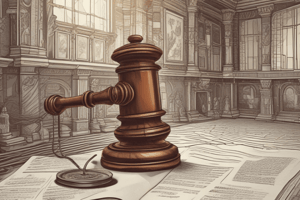Podcast
Questions and Answers
Vicarious liability means that an employer cannot be held responsible for the actions of their employees during work hours.
Vicarious liability means that an employer cannot be held responsible for the actions of their employees during work hours.
False (B)
Federalism is a principle that ensures all powers are concentrated at the federal government level, with no authority granted to state governments.
Federalism is a principle that ensures all powers are concentrated at the federal government level, with no authority granted to state governments.
False (B)
The Full Faith and Credit Clause requires states to honor the public acts, records, and judicial proceedings of every other state.
The Full Faith and Credit Clause requires states to honor the public acts, records, and judicial proceedings of every other state.
True (A)
Equitable remedies are designed to provide compensation in the form of monetary damages to the injured party.
Equitable remedies are designed to provide compensation in the form of monetary damages to the injured party.
The Articles of Confederation was deemed insufficient because it established a strong federal government with extensive powers.
The Articles of Confederation was deemed insufficient because it established a strong federal government with extensive powers.
The Supremacy Clause states that state laws are superior to federal laws.
The Supremacy Clause states that state laws are superior to federal laws.
Diversity of citizenship allows federal courts to hear cases involving parties from the same state.
Diversity of citizenship allows federal courts to hear cases involving parties from the same state.
The Dormant Commerce Clause allows states to enforce laws that discriminate against out-of-state businesses.
The Dormant Commerce Clause allows states to enforce laws that discriminate against out-of-state businesses.
In personam jurisdiction pertains solely to the property involved in a legal dispute.
In personam jurisdiction pertains solely to the property involved in a legal dispute.
Judicial review allows courts to interpret laws without the possibility of overturning them.
Judicial review allows courts to interpret laws without the possibility of overturning them.
Study Notes
Law: Differences between Public and Private Law
- Public law governs relationships between individuals and the government, addressing issues such as constitutional law and administrative law.
- Private law regulates relationships among individuals, including contract law and tort law.
Liability: Vicarious Liability
- Vicarious liability holds an employer or principal legally responsible for the negligent actions of an employee or agent when performed within the scope of employment.
Sources of American Law: Role of the US Constitution
- The US Constitution serves as the supreme law, establishing the framework for government and the rights of individuals, guiding legislative and judicial actions.
Uniform Law: Purpose of the UCC
- The Uniform Commercial Code (UCC) standardizes commercial transactions across states, facilitating smooth interstate commerce by providing consistent legal guidelines.
Administrative Law: Impact of Regulations
- Regulations from administrative agencies can impose requirements on businesses, affecting compliance, operational procedures, and sometimes even market competition.
Federal Agencies: Executive vs Independent Regulatory Agencies
- Executive agencies operate under direct control of the president, while independent regulatory agencies function autonomously to regulate specific economic sectors.
Case Law: Judicial Influence on Statutory Interpretation
- Judicial decisions shape how statutes are understood and applied, creating precedents that guide future cases in the legal system.
Early English Courts: Courts of Law vs Courts of Equity
- Courts of law focus on monetary damages and strict legal rules, whereas courts of equity provide remedies based on fairness and justice, such as injunctions.
Courts of Law vs Courts of Equity: Equitable Remedies
- Equitable remedies differ from monetary damages as they aim to provide specific performance or injunctions rather than financial compensation.
Case Precedents vs Case Reporters: Importance of Precedent
- Precedents ensure consistency in judicial decisions, providing a framework that lower courts must follow, promoting stability in the legal system.
Stare Decisis/Common Law: Promoting Legal Stability
- Stare decisis upholds precedents, encouraging courts to follow established rulings which fortifies predictability and coherence in legal interpretations.
Binding Authority: Impact on Lower Courts
- Binding authority comprises laws and precedents that lower courts must adhere to, ensuring a uniform application of legal standards across jurisdictions.
Legal Reasoning (IRAC): Method in Legal Analysis
- The IRAC method (Issue, Rule, Application, Conclusion) provides a structured framework for analyzing legal issues, formulating coherent arguments.
Jurisprudence: Legal Realism vs Natural Law
- Legal realism emphasizes the role of social context and judicial behavior in law, while natural law posits that certain rights are inherent and universal.
Substantive Law vs Procedural Law
- Substantive law defines rights and duties, while procedural law outlines the processes to enforce those rights in court.
Civil Law vs Criminal Law vs Cyber Law
- Civil law deals with disputes between individuals or organizations, criminal law addresses violations against society, and cyber law pertains to digital and internet-related issues.
United States Code vs State Codes vs Administrative Rulings
- Administrative rulings are decisions made by administrative agencies, which provide regulatory interpretations; they differ from statutes by focusing more on specific application than general law.
Appellant vs Appellee
- The appellant initiates an appeal in a higher court seeking to overturn a lower court’s decision, while the appellee argues to uphold that decision.
Enumerated Powers of Congress
- The US Constitution grants Congress specific powers, including the ability to levy taxes, regulate interstate commerce, and declare war.
Articles of Confederation
- The Articles of Confederation were replaced due to their inadequate central government structure that hindered effective governance and cooperation among states.
Bill of Rights: Protecting Individual Liberties
- The Bill of Rights enumerates protections for individual freedoms, including speech, religion, and the right to due process.
Federalism & Federal Powers
- Federalism divides power between state and federal governments, allowing both to enact laws within their respective areas of authority.
Sovereignty: State Sovereignty in Federalism
- State sovereignty refers to the independent authority of states to govern themselves without federal interference.
Privileges and Immunities Clause
- This clause ensures that citizens have the same rights in every state, preventing discrimination against out-of-state citizens.
Full Faith and Credit Clause
- It mandates that states recognize the public acts, records, and judicial proceedings of other states, promoting cooperative governance.
Branches of Government: Distinct Roles
- The legislative branch makes laws, the executive branch enforces them, and the judicial branch interprets them, ensuring checks on power.
Checks and Balances
- This system prevents any one branch of government from gaining excessive power by allowing each branch to limit the actions of others.
Commerce Clause
- The Commerce Clause empowers Congress to regulate interstate and international trade, which is key to economic policy.
Dormant Commerce Clause
- This principle restricts states from enacting legislation that discriminates against or excessively burdens interstate commerce.
Supremacy Clause
- Establishes that federal law prevails over state laws in cases of conflict, ensuring uniformity in law across the nation.
Preemption
- Federal preemption occurs when federal law overrides state laws in areas where the federal government has legislated.
Congressional Intent
- Courts consider congressional intent in interpreting statutes to ensure that the law is applied as Congress intended when it was enacted.
Fourteenth Amendment: Equal Rights Protection
- This amendment guarantees equal protection under the law and prohibits discrimination by state governments.
Judicial Interpretation
- Courts interpret laws through various approaches, including textualism, intentionalism, and pragmatism, shaping the application of law.
Compelling Government Interest
- A compelling government interest justifies restrictions on constitutional rights, particularly in matters such as public safety or national security.
Corporate Political Speech
- Corporate political speech is protected under the First Amendment, allowing corporations to express opinions on political matters.
Commercial Speech: Protected Examples
- Commercial speech, like advertisements, is protected as long as it is not misleading or promoting illegal activities.
Unprotected Speech
- Types of speech not protected by the First Amendment include incitement to violence, obscenity, and true threats.
Body of American Law: Main Sources
- The primary sources of American law include the Constitution, statutes, regulations, and case law.
Judicial Review
- Judicial review empowers courts to invalidate laws and executive actions that violate the Constitution, ensuring adherence to constitutional principles.
Jurisdiction
- Jurisdiction defines a court’s authority to hear cases, influencing the venue in which legal disputes are resolved.
In Personam vs In Rem Jurisdiction
- In personam jurisdiction refers to a court's authority over individuals, while in rem jurisdiction pertains to cases involving property.
Long Arm Statute
- Long arm statutes extend a state's jurisdiction to include out-of-state defendants with sufficient contacts to the state.
Probate Court & Bankruptcy Court
- Probate courts manage the distribution of deceased individuals' estates, while bankruptcy courts handle bankruptcy filings and proceedings.
Original Jurisdiction vs Appellate Jurisdiction
- Original jurisdiction is the authority to hear a case first, while appellate jurisdiction involves reviewing decisions made by lower courts.
Federal Question Jurisdiction
- Federal question jurisdiction applies to cases involving issues that arise under the Constitution, federal laws, or treaties.
Diversity of Citizenship
- Diversity jurisdiction allows federal courts to hear cases involving parties from different states to minimize bias in state courts.
Exclusive vs Concurrent Jurisdiction
- Exclusive federal jurisdiction applies only to federal courts, whereas concurrent jurisdiction allows both federal and state courts to hear certain cases.
Question of Fact vs Question of Law
- Questions of fact are resolved by juries, while questions of law are decided by judges.
Federal Court System: Three Levels
- The federal court system comprises District Courts (trial courts), Courts of Appeals (appellate courts), and the Supreme Court.
Writ of Certiorari & Rule of Four
- The Rule of Four requires four Supreme Court justices to agree to hear a case for a writ of certiorari to be granted.
Litigation Process
- The litigation process involves filing a complaint, discovery, trial, and potentially appeal, navigating through the court system.
Studying That Suits You
Use AI to generate personalized quizzes and flashcards to suit your learning preferences.
Description
This quiz explores fundamental legal concepts including vicarious liability, federalism, and the Full Faith and Credit Clause. It covers important principles of law that govern the relationship between states and the federal government. Test your understanding of these key legal tenets.




